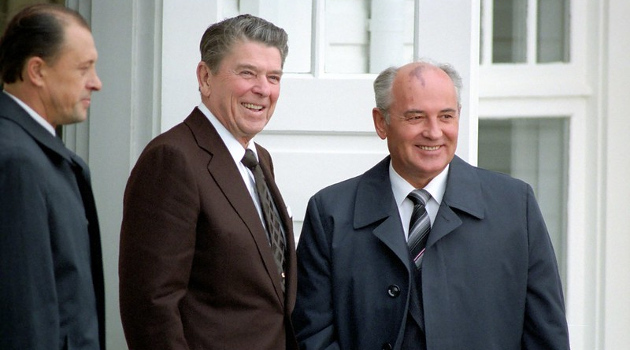The world is much freer today than when I was born, largely because the “Evil Empire” collapsed.
The Soviet Union was awful. It killed at least 20 million of its own people (some say as many as 60 million). It enslaved and impoverished its own citizens, as well as those who languished behind the “Iron Curtain.”
Ronald Reagan deserves the lion’s share of the credit for the collapse of communism – in part because he restored America’s economic vitality and built up the nation’s military, but also because he directly condemned the immorality of Marxism (often using humor).
But since the last dictator of the Soviet Union just died, let’s examine Mikhail Gorbachev’s role.
An editorial in today’s Wall Street Journal is worth reading because it explains that his biggest achievement was not using bloodshed to preserve communist rule.
Mikhail Gorbachev…rose through the Communist ranks but presided over the end of the regime. His greatest achievement was allowing the Cold War to end without a war or a worse conflagration that the world feared for decades. …He understood that the country he inherited in 1985 when he became general secretary of the Communist Party was losing the Cold War to a revitalized West. Its economy wasn’t the juggernaut of central-planning genius that the CIA had assessed at the time. …Ronald Reagan had reversed the U.S. malaise of the 1970s with a defense buildup and reforms that unleashed America’s private economy. …Gorbachev’s reforms were intended to revive the Soviet regime to be able to compete with Reagan’s America. …The countries of Eastern Europe, long enslaved as members of the Warsaw Pact, saw their moment to break free. Gorbachev refused to send in the tanks as his Soviet predecessors had done in Hungary and Czechoslovakia. …mutual trust between Gorbachev and Reagan…helped to bring the Cold War to an end with freedom as the victor.
George Will is also grateful that Gorbachev allowed Soviet communism to whither away without violence. Here’s some of what he wrote in his Washington Post column.
Failing upward into the world’s gratitude, Mikhail Gorbachev became a hero by precipitating the liquidation of the political system he had tried to preserve… Like Christopher Columbus, who accidentally discovered the New World, Gorbachev stumbled into greatness by misunderstanding where he was going. …Gorbachev’s most noble facet, his “extraordinary reluctance” to use violence to hold the Soviet system together. …President Ronald Reagan…described the Soviet Union as “the focus of evil in the modern world.” …he launched a high-tech challenge to a Soviet Union in which 30 percent of hospitals lacked indoor plumbing. …The Soviet Union’s brittle husk crumbled as Gorbachev struggled to preserve it. His reputation rests on the world’s amnesia about this.
Professor William Taubman of Amherst also opined in today’s Wall Street Journal.
He seems more sympathetic to Gorbachev than George Will, but also lauds him for opting against a bloody crackdown.
Mikhail Gorbachev…deserves to be celebrated… When he entered office in 1985, Gorbachev had almost unlimited power. He could have presided indefinitely over the status quo. Instead, he…acquiesced in the dismemberment of the Soviet empire without the violence that accompanied the collapse of most other empires. …he persuaded communist hard-liners to vote themselves out of office. …Gorbachev was happy to give up domination of Eastern Europe… Gorbachev tried to save the Soviet Union but ended up hastening its destruction. When it became clear in late 1991 that his great project was doomed, he could have lashed out, mobilizing the military to save him and what was left of the U.S.S.R., at the risk of civil war. Instead, he bowed out with dignity.
Matt Welch of Reason also weighs in, emphasizing that Gorbachev was not great, but that he allowed a great thing to happen.
f the late Mikhail Gorbachev had gotten his way, the world would look a lot different than it does now. Socialism would still be the dominant economic system from Leipzig to Yakutsk. The Warsaw Pact would still exist; a unified Germany would not, nor would the independent Baltic states. Above all, the planet would still be blighted by the wheezing and malevolent existence of what Ronald Reagan rightly described as “the evil empire”—the Union of Soviet Socialist Republics. …Yet we should not judge the eighth and final Soviet leader, who died Tuesday at the age of 91, by his base geopolitical desires but rather by the glorious human flourishing that his actions—and especially his inactions—allowed to take place. …November 9, 1989 became the most liberating day of the most liberating month of the most liberating year in human history.
Last but not least, David Satter shared some insights in a column late last year for the Wall Street Journal.
During its 70-year life, the Soviet regime killed at least 20 million of its citizens for political reasons. …however, the Soviet Union wasn’t indomitable. In 1988 the Soviet leader Mikhail Gorbachev allowed a space for free information in Soviet society, creating a contradiction between free speech and a system based on lies. When glasnost wasn’t repressed, it led to the collapse of the system. …President Reagan rejected the idea that the West had no alternative to accommodation. In the words of former Secretary of State Henry Kissinger, he took the offensive “ideologically and geostrategically.” …As for his strategy, Reagan said it was simple: “We win. They lose.” …the U.S. rearmament drive began to bear fruit. …Stunned by these developments, the Soviets eventually decided to take the risk of major reforms.
As you might expect, I like the emphasis on Reagan’s role. Yet another reason why he is the only great president of my lifetime.
The takeaway from today’s column is that Gorbachev mostly deserves praise for what he didn’t do. By opting against a crackdown, he allowed the Soviet Union to wind up on the “ash heap of history.”
And that’s a great result.
———
Image credit: The Official CTBTO Photostream | CC BY 2.0.







